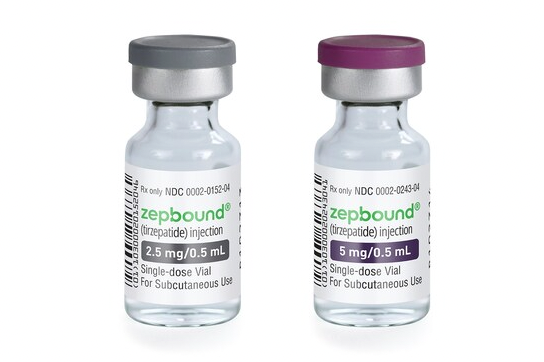
August 27, 2024
 Provided Image/Eli Lilly
Provided Image/Eli Lilly
Eli Lilly is lowering the cost of its popular weight-loss drug Zepbound. A four-week supply of its 2.5 mg dose will cost $399; a four-week supply of its 5 mg dose will run $549.
Eli Lilly has dropped the cost for lower doses of its popular weight loss drug Zepbound – but just for people who pay out-of-pocket.
The medication now will be sold in single-dose vials instead of as a preloaded injector pen, the pharmaceutical company said Tuesday. A four-week supply of the 2.5 mg dose will cost $399; a four-week supply of the 5 mg dose will run $549. Without insurance, the list price for a month's supply of all Zepbound doses previously was more than $1,000 prior.
MORE: Apple juice sold at Walmart recalled due to arsenic levels
"These new vials not only help us meet the high demand for our obesity medicine, but also broaden access for patients seeking a safe and effective treatment option," Patrik Jonsson, president of Lilly Cardiometabolic Health and Lilly USA, said in a statement.
The new prices are comparable to those Lilly offers to uninsured people through its discount program and are half the price of other in-demand weight loss medications like Wegovy, according to Eli Lilly. The cheaper low-dose Zepbound vials would expand availability to people who are not eligible for the savings program and to those not covered for weight loss, such as older Americans on Medicare.
Zepbound is the brand name for the drug tirzepatide, which helps people lose weight by mimicking hormones that are secreted after a meal. This gives the person taking the medication a feeling of being full, helping reduce appetite and the amount a person eats. Zepbound is supposed to be used as part of a regimen including increased exercise and a lower-calorie diet, according to the drug maker.
The Zepbound recommended maintenance doses for weight loss start at a 5 mg injection once a week, according to Lilly. A 2022 study showed that a 5 mg dose, along with a reduced calorie diet and increased physical activity, achieved an average of 15% weight loss over 72 weeks compared to 3.1% for a placebo.
"Despite obesity being recognized as a serious chronic illness with long-term consequences, it's often misclassified as a lifestyle choice, resulting in many employers and the federal government excluding medications like Zepbound from insurance coverage," Jonsson said. "Outdated policies and lack of coverage for obesity medications create an urgent need for more innovative solutions."
The company has not said it is discounting prices for its higher 10 mg and 15 mg, the other recommended maintenance doses.
People can obtain the Zepbound low-dose vials with prescriptions through the company's self-pay pharmacy, LillyDirect.
Zepbound had been in short supply since April, but the Food and Drug Administration removed it from its shortage list earlier in August.